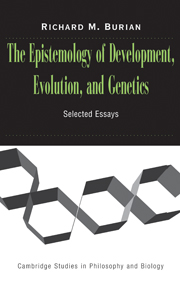1 - General Introduction
Published online by Cambridge University Press: 05 June 2012
Summary
Unlike many natural philosophers of the seventeenth century, whose work bridged what we now call science and philosophy, most twentieth-century philosophers of science did not undertake serious work in what we would now call science. Often enough, they wrote in reaction to earlier writings of scientists and philosophers of science, drawing on general background knowledge. Although the theories and analyses they produced were often fascinating, this narrow way of working put them at risk of making poor contact with the phenomena of concern to scientists. Some philosophical projects fell victim to this risk, including some attempts to construct general theories of scientific method, to develop criteria for distinguishing living from nonliving entities, and to specify the structure of major biological theories. Often enough, there turned out to be more things in heaven and earth than were dreamt of in our philosophies (Shakespeare, Hamlet, I. v). Philosophy, including philosophy of science, should begin with wonder at the phenomena that require understanding.
The development of philosophy of biology in the last thirty years or so has been salutary in this regard as it has become ever more involved with biological phenomena. Like many contemporary philosophers of biology, I maintain that the phenomena of biology, and its history, are more far more complex – and confusing – than traditional philosophers imagined. Thus, a central theme of the essays that follow is that philosophy of biology must be learned, taught, and thought about by working intensely with “real biology” and serious history of “real biology.”
- Type
- Chapter
- Information
- Publisher: Cambridge University PressPrint publication year: 2004

